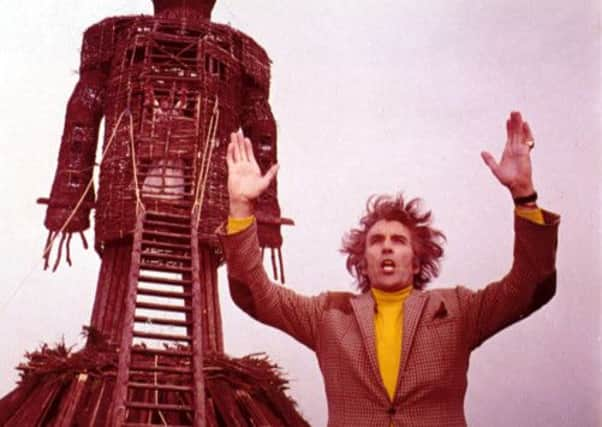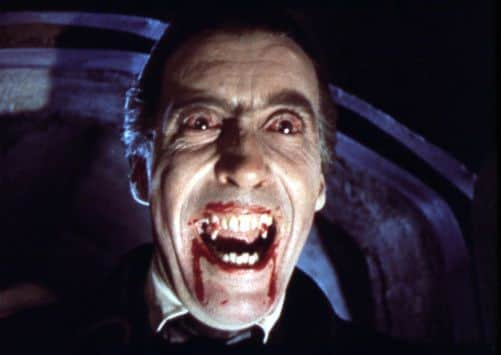Interview: Christopher Lee


IN the pantheon of cult movies The Wicker Man stands tall.
Shot in a rush in the early 1970s, shelved, recut, released on the bottom half of a double bill and finally given a new lease of life in America in the 1980s, it has garnered a reputation as one of the quirkiest films ever to emerge from Britain.
Its fans and admirers are legion – from John Landis and Tim Burton to Mark Gatiss and Nicolas Cage, who starred in an ill-advised remake in 2006. But there is no bigger champion of the film than 91-year-old Sir Christopher Lee who, as pagan aristocrat Lord Summerisle, played a role that was custom written for him.


Advertisement
Hide AdAdvertisement
Hide AdThe story of The Wicker Man is the story of British filmmaking in the 1970s. As the UK industry slowed almost to a standstill and the big American companies fled these shores it was left to modest concerns like British Lion, under the stewardship of 34-year-old Canadian-born managing director Peter Snell, to scrabble together a slate of pictures.
On that slate was The Wicker Man, an original story of the battle between paganism and Christianity from playwright Anthony Shaffer, creator of the theatre smash Sleuth and the man behind Alfred Hitchcock’s Frenzy.
Shaffer’s story takes a pious policeman, Neil Howie, from the Scottish mainland to the remote island of Summerisle. There he must investigate the mysterious disappearance of 12-year-old Rowan Morrison.But Howie (played by Edward Woodward) finds the islanders strangely disinclined to assist him with his inquiries. And his suspicions are magnified when he meets the mocking figure of the island’s laird (Lee).
In the years since its aborted release and ongoing revival everyone from Lee and Woodward to Shaffer and the film’s director, Robin Hardy, has lamented the loss of key scenes that, in their view, made The Wicker Man a truncated epic.
Advertisement
Hide AdAdvertisement
Hide AdLast year a worldwide hunt unearthed a print of the American director’s cut of the film. It is that version that has been restored for re-release for the 40th anniversary.
In a 60-year career Sir Christopher Lee – he was knighted in 2009 – has appeared in more than 300 films. They include the Lord of the Rings trilogy and its follow-up, The Hobbit. But it is The Wicker Man that means more than all the others. Why?
“First of all it was an extraordinarily unusual story. That was one reason. It’s the best script I’ve ever read, still. It’s a story which is romantic, erotic, very frightening but totally logical. And it was written for me, the part. There have been other parts written for me in mind, quite a few, but this was by far the best. It was outstanding.”
Even by 1970s standards the film was made for a song. Most of the principals didn’t take a fee. Lee has always claimed that he, Shaffer, Hardy and Snell did it for the love of the material. But the subject matter was always going to be an issue.
Advertisement
Hide AdAdvertisement
Hide AdPart musical, part horror story, part passion play, The Wicker Man was always bound to confound people, and it did. Forty years later, particularly to those that see it for the first time, it still does.
Much of the movie’s reputation rests on its tantalising blend of the sensual and the sinister. There are three blondes in the film – Britt Ekland, Diane Cilento and Ingrid Pitt – but each one is deadly in her own way. And for Edward Woodward, playing the virginal middle-aged copper, at least one represents a seductive saviour…
“As a young man I was always fascinated by the occult,” says Lee. “I’d read Frazer’s The Golden Bough, a great deal of which is about Celtic belief, sacrifice, superstition, and so on. So I was already very well versed in the subject matter.
“And what I brought to it was whatever I can bring as an actor. Summerisle has to be a gracious host, he has to be a nobleman, he has to be the ruler of the community, he has to be charming, he has to be apparently very helpful.
“But at the same time he has to be totally lethal.
Advertisement
Hide AdAdvertisement
Hide Ad“So there is a bit of me in Summerisle, but it’s only the way I talk, and my sense of humour which, of course, is of colossal importance because Summerisle says some extremely abusive things. He’s a very witty man; I’m not saying I would call myself a very witty man, but there were certain elements of my own character as a person – physical, mental, whatever you like to call it – which were already there. Those elements I was able to bring to playing Lord Summerisle.”
The history of The Wicker Man involves more than its fair share of alleged corporate skulduggery which includes the bizarre claim that the film was deliberately sabotaged. The conclusion of that particular tale is that cans of 35mm film containing crucial sequences ended up dumped in a hole in the ground and buried.
The new final cut does not restore such footage. Instead, under the watchful eye of Robin Hardy, it presents his version of the film – the version that played in America.
Lee has his own memories of seeing a butchered version of the film: “I thought ‘My God, there’s a tremendous amount which isn’t in there.’ All the characters – the doctor, the chemist, the butcher, the baker and the fishmonger, and all these other people on the island – were all very considerably developed and were not in the final result.
Advertisement
Hide AdAdvertisement
Hide Ad“In addition to that, the first meeting of Howie and Summerisle is pages of stuff, which we got over by going from one set to another. Extremely witty, brilliant, very, very outstanding dialogue, all cut. All gone.”
Will the so-called final cut restore the faith of fans and stars alike? And in this digital age where anything is possible, does final really mean final…?
Original negative remains elusive
THE campaign to find lost elements of The Wicker Man was launched in April.
By July 24 StudioCanal had announced that it was unable to locate the original negative but that it would release “a version of the film that is true to Robin Hardy’s original vision”, representing the longest cut ever screened in UK cinemas.
Advertisement
Hide AdAdvertisement
Hide AdSeveral different versions of the film are known to be in existence. The most famous was presented by Sid and Nancy director Alex Cox as part of the Moviedrome strand and restored a flashback sequence involving Edward Woodward.
The Wicker Man is reissued and on general release nationwide.